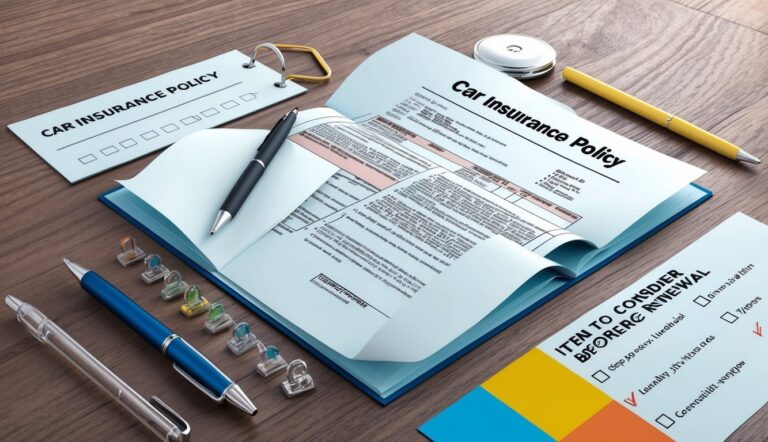Car insurance renewal is a crucial process that vehicle owners face regularly.
It’s an opportunity to reassess your coverage needs and potentially save money on premiums.
Understanding the key factors to consider can help you make informed decisions about your auto insurance.
Reviewing your car insurance before renewal can lead to better coverage and lower rates. By taking a proactive approach, you can ensure that your policy aligns with your current situation and budget.
The following tips will guide you through important aspects to evaluate when it’s time to renew your car insurance policy.
1) Policy Renewal Date
Knowing your car insurance policy renewal date is crucial.
Most policies renew every six or twelve months.
You can find this information in your policy documents or by contacting your insurance provider.
Your insurer will typically send a renewal notice about a month before your policy expires.
This gives you time to review your coverage and make any necessary changes.
Mark your renewal date on your calendar.
This reminder helps you avoid a lapse in coverage, which can lead to legal issues and higher premiums.
If you’re unsure about your renewal date, check your insurance card or recent billing statements.
These often include the policy period dates.
Your renewal date is an opportunity to reassess your insurance needs.
Use this time to review your coverage and shop around for better rates if needed.
Some insurers offer automatic renewal options.
While convenient, it’s still important to review your policy before it renews automatically.
Be aware that your renewal date may change if you make significant policy modifications mid-term.
Always confirm the new renewal date if you make such changes.
2) Current Coverage Review
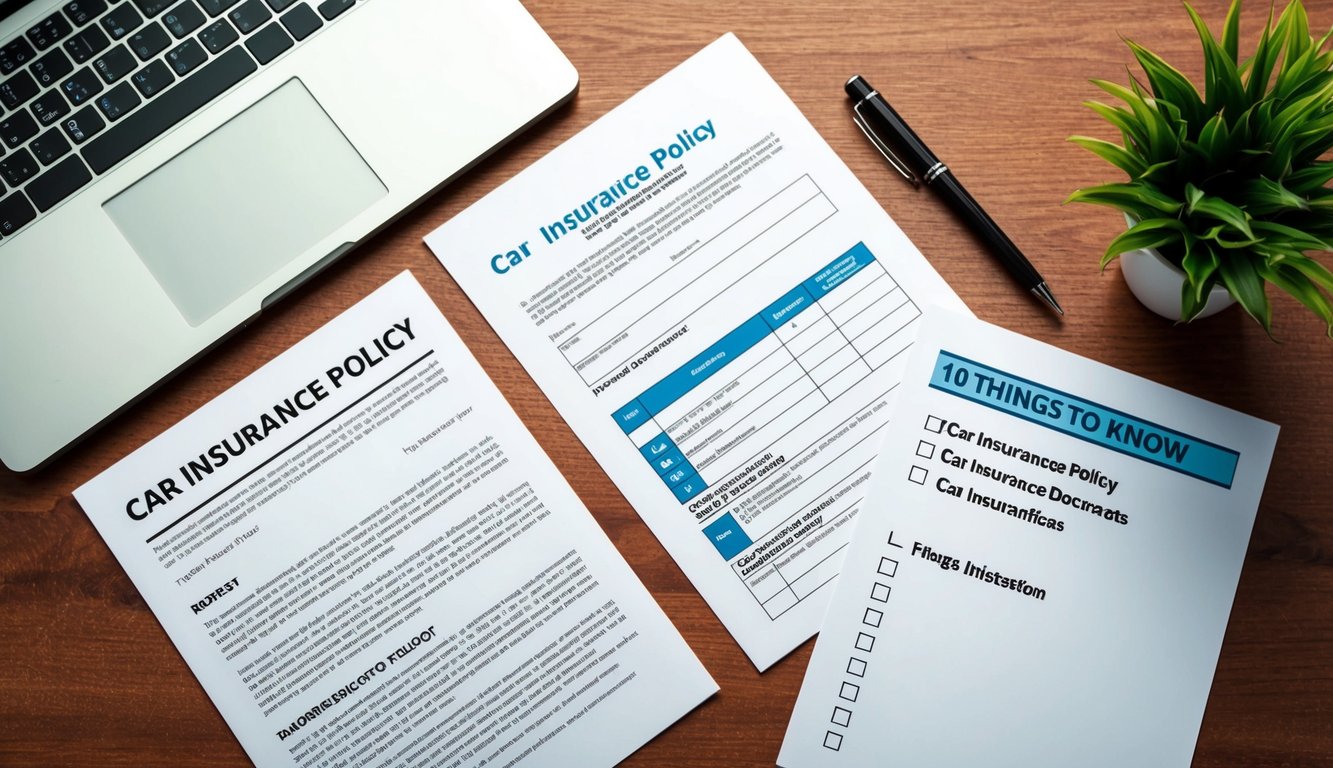
Before renewing your car insurance, take time to review your current coverage.
Examine your policy documents to understand what protection you currently have.
Look at your liability limits, collision coverage, and comprehensive coverage.
Check if you have additional options like roadside assistance or rental car reimbursement.
Consider if your coverage still meets your needs.
Your circumstances may have changed since you first purchased the policy.
For example, if you’ve paid off your car loan, you may no longer need full coverage.
Assess whether you’re over-insured or under-insured.
If your car has significantly depreciated, you might reduce collision coverage.
Conversely, if you’ve acquired valuable assets, you may want to increase liability limits.
Don’t forget to review your deductibles.
A higher deductible can lower your premium, but make sure you can afford it if you need to file a claim.
Check for any coverage gaps.
If you use your car for business or ridesharing, ensure your policy covers these activities.
Lastly, look for any discounts you might be eligible for.
Many insurers offer discounts for safe driving, multiple policies, or safety features in your vehicle.
3) Comparison of New Quotes
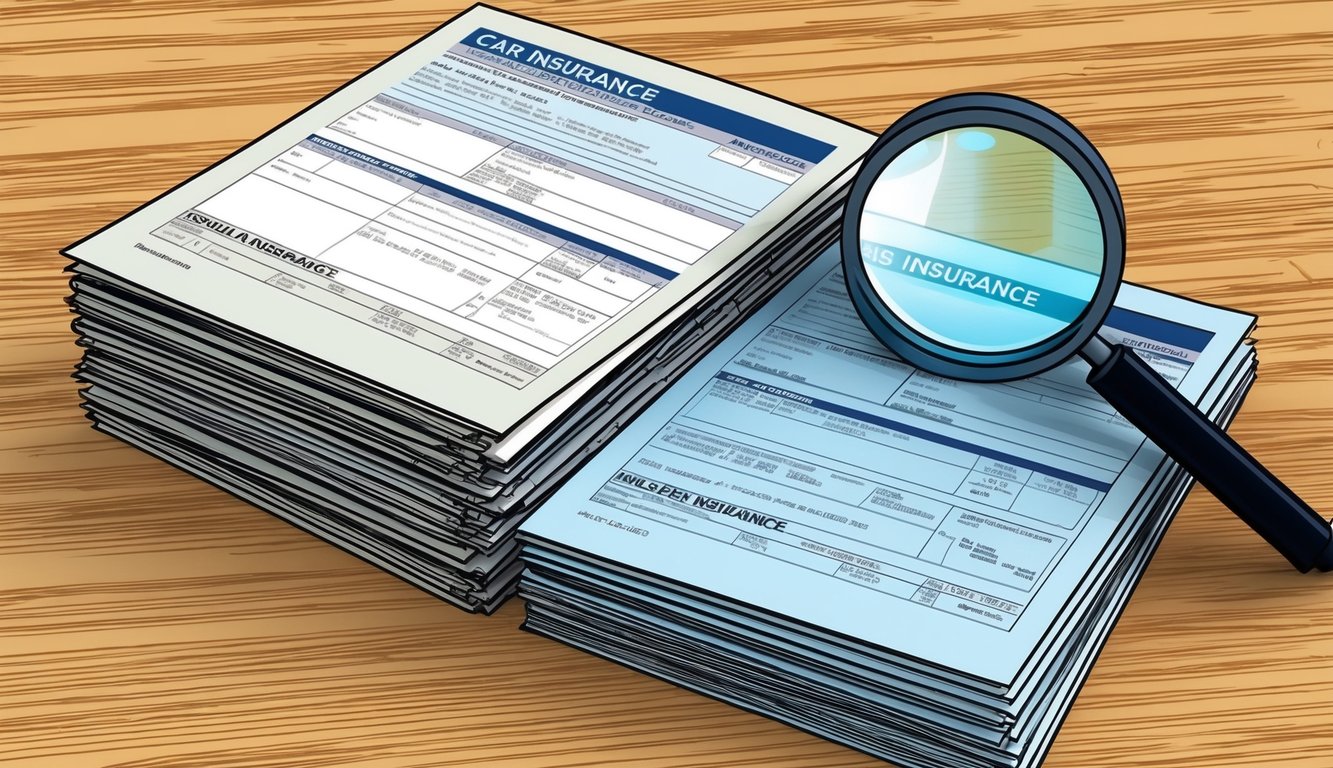
Before renewing your car insurance, it’s crucial to compare new quotes from different providers.
This process can help you find better rates and coverage options.
Start by gathering quotes from at least three different insurance companies.
You can do this online, over the phone, or through an insurance agent.
When comparing quotes, look beyond just the price.
Consider the coverage limits, deductibles, and any additional features or benefits included in each policy.
Pay attention to discounts offered by different insurers.
Some may provide better savings for your specific situation, such as good driver discounts or multi-policy bundles.
Don’t forget to check your coverage and deductible options with each quote.
Adjust these to match your current needs and financial situation.
Be sure to provide the same information to each insurer when requesting quotes.
This ensures you’re comparing similar policies and getting accurate pricing.
If you find a better deal elsewhere, don’t hesitate to ask your current provider if they can match or beat it.
Many insurers are willing to negotiate to keep loyal customers.
Remember that the cheapest option isn’t always the best.
Consider the insurer’s reputation, customer service, and claims process when making your decision.
By taking the time to compare new quotes, you can potentially save money and find a policy that better suits your needs.
4) Discount Opportunities
Car insurance companies offer various discounts that can significantly reduce your premiums.
It’s crucial to explore these options before renewing your policy.
Many insurers provide multi-policy discounts if you bundle your auto insurance with other policies like home or renters insurance.
This can lead to substantial savings on both policies.
Safe driving habits can also earn you discounts.
Some companies offer lower rates for drivers with clean records or those who complete defensive driving courses.
Paying your entire policy upfront could result in a paid-in-full discount.
While this may require a larger initial payment, it can save you money in the long run.
Installing safety features in your vehicle, such as anti-theft devices or advanced safety systems, may qualify you for additional discounts.
Check with your insurer to see which features they recognize.
Many insurers offer discounts for good students or for young drivers who maintain good grades.
If you or a family member on your policy is a student, this could lead to savings.
Some companies provide loyalty discounts for long-term customers.
However, it’s still wise to compare rates with other insurers to ensure you’re getting the best deal.
Remember, discount amounts can vary widely between insurers.
Always ask your provider about all available discounts and how they apply to your specific situation.
5) Driving Habits Update
Your driving habits can significantly impact your car insurance rates.
Before renewing your policy, take a moment to reflect on any changes in your driving patterns over the past year.
Have you started working from home, reducing your daily commute? This could lead to lower premiums as you’re spending less time on the road.
Conversely, if you’ve taken on a new job with a longer commute, you may need to adjust your coverage.
Be sure to inform your insurer about any substantial changes in your annual mileage.
Consider any improvements in your driving behavior.
Have you become more cautious or started using public transportation more frequently? These factors can positively influence your insurance rates.
It’s also important to disclose any traffic violations or accidents you’ve had since your last renewal.
While this might seem counterintuitive, honesty is crucial.
Insurance companies can access this information, and failing to disclose it could lead to complications.
If you’ve completed a defensive driving course, mention this to your insurer.
Many companies offer discounts for drivers who have taken steps to improve their skills and safety on the road.
Lastly, if you’ve installed any safety features in your vehicle, such as anti-theft devices or advanced driver assistance systems, inform your insurer.
These additions can often result in lower premiums due to reduced risk.
6) Vehicle Information Accuracy
When renewing your car insurance, make sure your vehicle information is up-to-date and accurate.
This includes details like your car’s make, model, year, and Vehicle Identification Number (VIN).
Providing correct information helps insurers assess risk accurately and calculate your premium.
If any changes have occurred, such as modifications to your vehicle or a change in its primary use, you should report these to your insurer.
Inaccurate vehicle information can lead to problems if you need to make a claim.
Your insurer might deny coverage or adjust your payout if the details don’t match what’s on your policy.
Take time to review your policy documents carefully before renewal.
Check that all vehicle specifications are correct, including mileage estimates if your policy factors in annual driving distance.
If you’ve recently moved, make sure your new address is reflected in your policy.
Your location can affect your insurance rates, so keeping this information current is essential.
Remember to update any safety features or anti-theft devices you’ve added to your vehicle.
These can often lead to discounts on your premium, so it’s in your best interest to keep this information current.
7) Claim History Verification
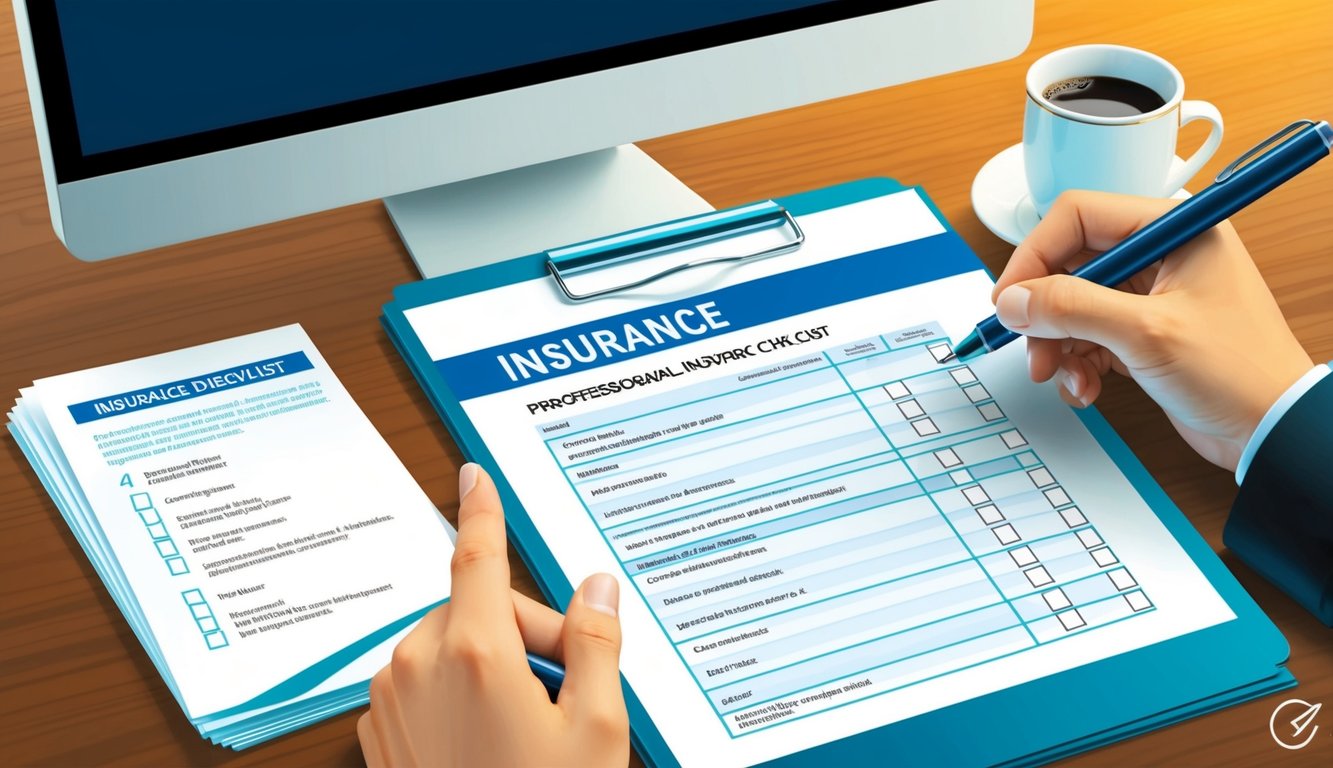
Before renewing your car insurance, make sure to verify your claim history.
Your claim history plays a significant role in determining your insurance premiums and coverage options.
Most insurance companies keep your claims on record for three to five years.
Knowing what’s in your claim history can help you understand what rates to expect when shopping for a new policy.
You can request a copy of your claims history report from your current insurer.
This report will show all the claims you’ve made, including the dates and amounts paid out.
Review this report carefully for any errors or discrepancies.
If you find any inaccuracies, contact your insurance company immediately to have them corrected.
Keep in mind that even if an accident isn’t on your motor vehicle record (MVR), it may still appear in your claims history.
This includes damages you caused to others or damage to your own vehicle.
Understanding your claim history can help you make informed decisions about your coverage needs.
It can also prepare you for potential rate increases or changes in your policy terms.
If you’ve had a clean record for several years, you might be eligible for safe driver discounts.
Don’t hesitate to ask your insurer about these potential savings when renewing your policy.
8) Mileage Adjustment
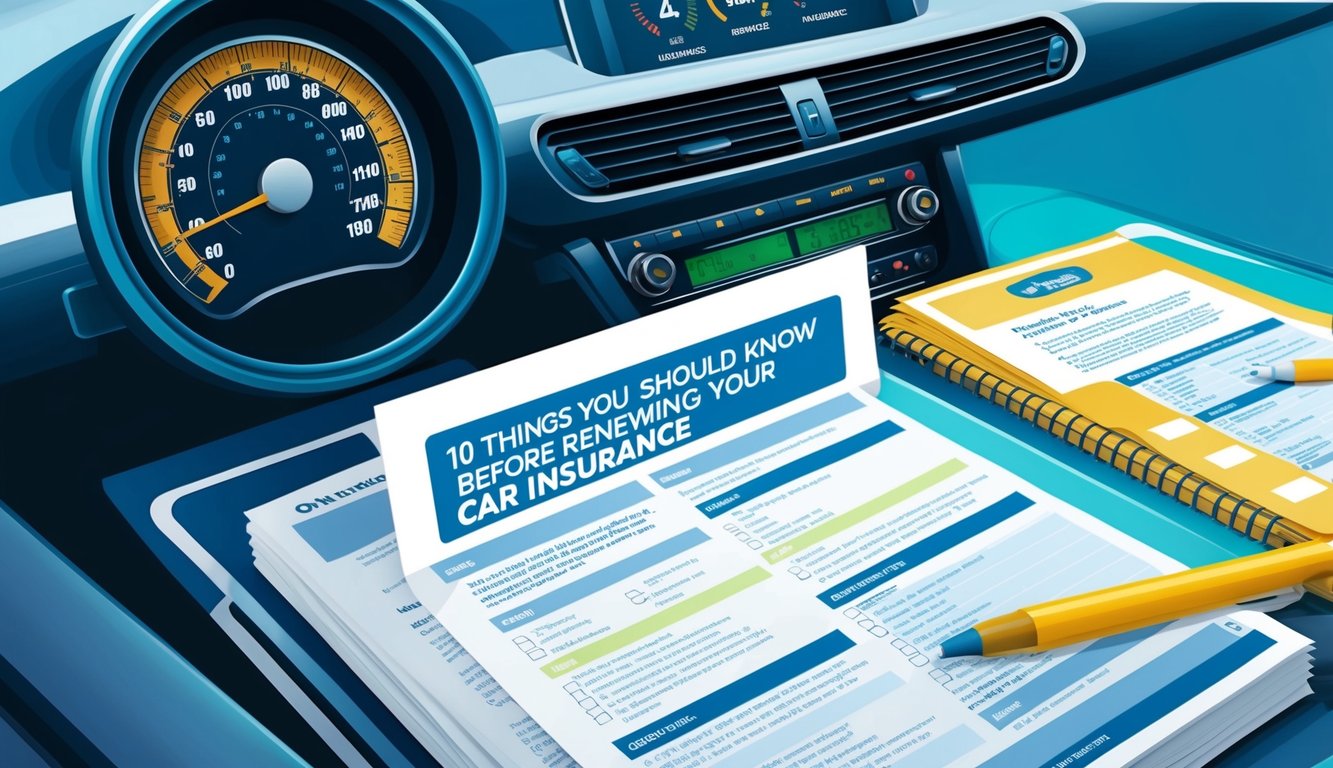
Your annual mileage significantly impacts your car insurance rates.
Before renewing your policy, review your current mileage estimate and adjust it if necessary.
If you’re driving less than before, you may qualify for lower premiums.
Many people have changed their driving habits due to remote work or lifestyle changes.
Updating your mileage can lead to cost savings.
Some insurers offer pay-per-mile insurance, where your monthly premium varies based on how much you drive.
Be honest about your mileage.
Underreporting can lead to issues if you need to make a claim.
Overreporting means you might be paying more than necessary.
Keep track of your odometer readings throughout the year.
This will help you provide an accurate estimate when it’s time to renew.
If you’ve switched to a longer commute or started using your car more frequently, inform your insurer.
While this might increase your premium, it ensures you have proper coverage.
Your insurance company may ask for proof of mileage, so be prepared to provide documentation if requested.
9) Bundling Options
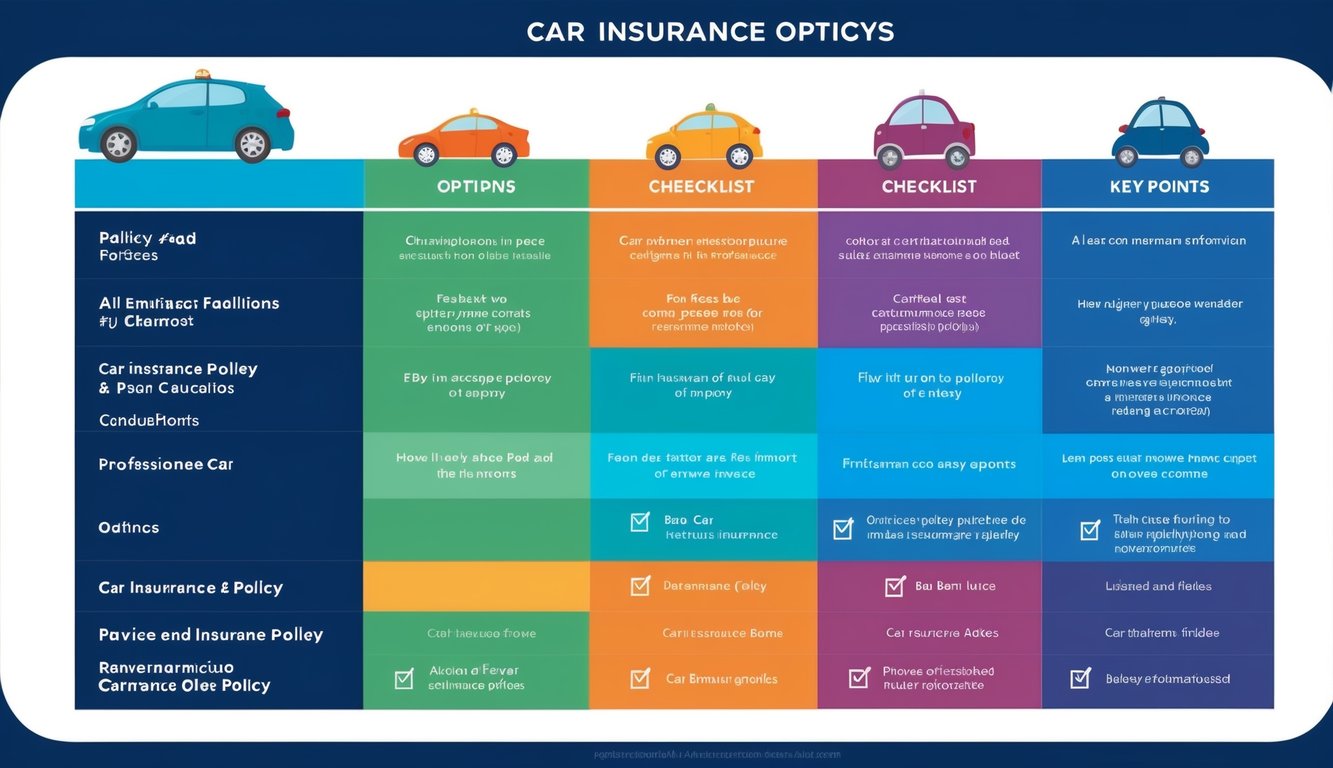
When renewing your car insurance, consider bundling options.
Many insurers offer discounts when you combine multiple policies, such as auto and home insurance.
Bundling car and home insurance can lead to significant savings on your premiums.
Some companies provide multi-policy discounts that apply to your auto insurance when you pair it with home or renters insurance.
You may find that bundling simplifies your insurance management.
Having all your policies with one provider can streamline billing and claims processes.
However, bundling isn’t always the best choice.
It’s important to compare the bundled price against separate policies from different insurers.
Sometimes, individual policies from different companies may be cheaper.
Keep in mind that bundling can make it less likely for you to shop around regularly.
This might cause you to miss out on better rates elsewhere.
Bundling options often extend beyond just auto and home insurance.
Many insurers offer bundles that include renters, life, or umbrella policies.
Some companies, like Progressive, even provide unique bundling opportunities for items such as watercraft, jewelry, and special events coverage.
Before deciding to bundle, carefully review the coverage and prices.
Ensure the bundled policies meet all your insurance needs and truly offer better value than separate policies.
10) Changes in Personal Information
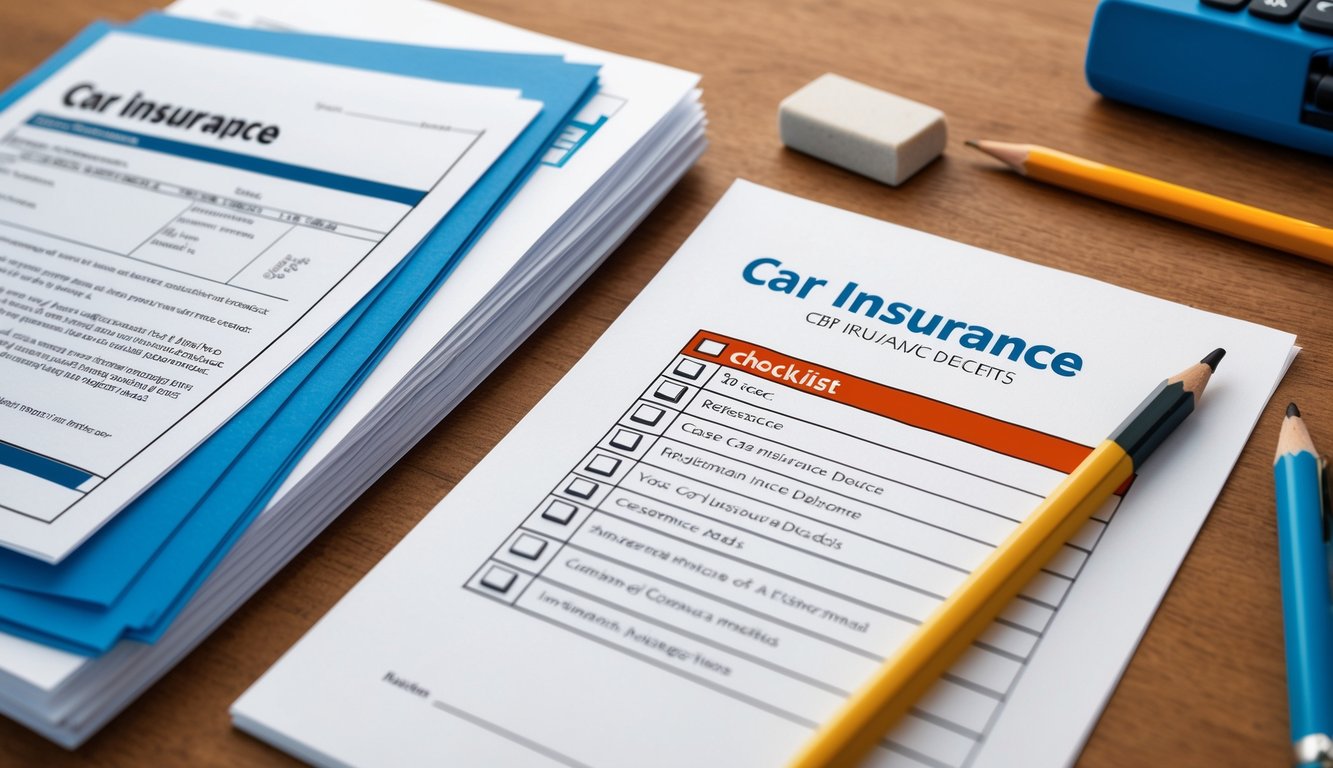
When renewing your car insurance, it’s crucial to update any changes in your personal information.
Your address, marital status, and occupation can all impact your insurance rates.
If you’ve moved, be sure to inform your insurer.
Your new location may affect your premiums based on factors like crime rates and parking situations.
Marital status changes should also be reported.
Getting married often leads to lower rates, as insurers view married individuals as more stable and less likely to file claims.
Your occupation can influence your insurance costs too.
Some jobs are considered lower risk, potentially resulting in better rates.
Always notify your insurer if you’ve changed careers.
Don’t forget to update information about additional drivers in your household.
If someone has moved out or a new driver has been added, this needs to be reflected in your policy.
Changes in your credit score can affect your insurance rates in many states.
If your score has improved, you might qualify for better rates.
Updating your annual mileage is important too.
If you’re driving less due to retirement or working from home, you could be eligible for lower premiums.
Understanding Your Current Policy
Before renewing your car insurance, it’s crucial to review your existing policy thoroughly.
Familiarize yourself with the key components that affect your coverage and costs.
Coverage Limits
Your policy’s coverage limits determine the maximum amount your insurer will pay in the event of a claim.
Review these limits carefully to ensure they meet your current needs.
Check your policy documents for specific coverage types and their respective limits.
Common coverages include liability, collision, and comprehensive.
Consider whether your limits are sufficient to protect your assets.
If you’ve acquired new property or experienced a change in financial situation, you may need to adjust your coverage.
Premium Costs
Your premium is the amount you pay for insurance coverage. Review your current premium and compare it to previous years.
Factors affecting your premium may include:
- Your driving record
- Vehicle make and model
- Age and location
- Credit score (in some states)
If you notice a significant increase, contact your insurer to understand the reasons behind the change.
Ask about available discounts or ways to lower your premium.
Deductibles
Your deductible is the amount you pay out-of-pocket before your insurance coverage kicks in.
Higher deductibles typically result in lower premiums, while lower deductibles mean higher premiums.
Assess your current deductibles for each coverage type.
Consider your financial situation and ability to pay the deductible in case of an accident.
If you’ve built up an emergency fund, you might consider raising your deductible to lower your premium.
Conversely, if you’re concerned about out-of-pocket costs, a lower deductible might be more appropriate.
Factors Affecting Insurance Rates
Car insurance rates are influenced by several key factors that insurers consider when determining premiums.
Understanding these factors can help you make informed decisions about your coverage.
Driving Record
Your driving history plays a crucial role in determining your insurance rates. A clean driving record typically leads to lower premiums.
Accidents, speeding tickets, and other traffic violations can significantly increase your rates.
Insurance companies view drivers with a history of infractions as higher risk.
This often results in higher premiums to offset the potential cost of future claims.
Recent accidents or moving violations have a more substantial impact on your rates than older incidents.
Many insurers offer safe driver discounts for those who maintain a clean record over time.
Vehicle Make and Model
The type of car you drive directly affects your insurance costs. Expensive or high-performance vehicles generally cost more to insure due to higher repair or replacement costs.
Cars with advanced safety features may qualify for discounts.
These features can include anti-lock brakes, airbags, and collision avoidance systems.
Vehicles that are frequently targeted by thieves often have higher insurance premiums.
Insurance companies consider the likelihood of theft when calculating rates.
The age of your vehicle also matters.
Newer cars typically cost more to insure due to their higher value, while older vehicles may have lower premiums.
Location
Where you live and park your car significantly impacts your insurance rates.
Urban areas with higher population densities and traffic congestion often have higher premiums due to increased accident risks.
Areas with high crime rates may lead to higher insurance costs, especially for comprehensive coverage that protects against theft and vandalism.
Your specific ZIP code matters.
Even within the same city, different neighborhoods can have varying insurance rates based on local factors like accident frequency and property crime statistics.
Climate and natural disaster risks in your area can affect rates.
Regions prone to hurricanes, floods, or severe storms may have higher premiums to account for potential weather-related damage.


